|
|
|
Sort Order |
|
|
|
Items / Page
|
|
|
|
|
|
|
| Srl | Item |
| 1 |
ID:
181187
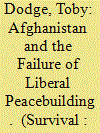

|
|
|
|
|
| Summary/Abstract |
The collapse of the US-aligned Afghan government and the seizure of Kabul by the Taliban in 2021 as the United States withdrew its forces was ultimately caused by a change in US government policy in June 2003. At that point, the George W. Bush administration dropped its aversion to state-building and its plan for a limited intervention designed to rid the country of al-Qaeda and the Taliban. The US instead undertook an extended exercise in liberal peacebuilding, involving the creation of an institutionally and coercively powerful centralised Afghan state and a liberal-democratic system. This enterprise was inherently misconceived, largely ignoring Afghan history and culture, as well as the limitations of the US and its partners. The painful experience of the past 18 years indicates that liberal peacebuilding, at least along the lines of the US-led effort in Afghanistan, should not be attempted again.
|
|
|
|
|
|
|
|
|
|
|
|
|
|
|
|
| 2 |
ID:
093886
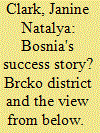

|
|
|
|
|
| Publication |
2010.
|
| Summary/Abstract |
Situated in the far northeastern corner of Bosnia and Herzegovina, Brcko District is widely heralded as a successful multi-ethnic society. Such portrayals are typically 'top down' and centred on institutions, yet it cannot be assumed that multi-ethnicity at the institutional level necessarily translates into everyday relations between Brcko's ethnic groups. Based on qualitative interview data, this article explores Brcko from the 'bottom up', through a focus on inter-ethnic relations in everyday life. Its central argument is that viewing Brcko through this additional lens not only raises important questions about the District's image as a success story but also, and more broadly, has significant implications in highlighting the limitations of liberal peacebuilding and the importance of 'peacebuilding from below'.
|
|
|
|
|
|
|
|
|
|
|
|
|
|
|
|
| 3 |
ID:
091971
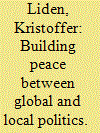

|
|
|
|
|
| Publication |
2009.
|
| Summary/Abstract |
What are the ethical implications of the shortcomings of liberal peacebuilding operations? This article addresses the problem by investigating the normative premises of liberal peacebuilding and its critics. Three ideal types of peacebuilding are singled out to illuminate the normative logic of current 'revisionist' proposals. These are: 're-liberal peacebuilding' which prescribes a more coercive approach; 'social peacebuilding' that emphasizes local agency and the promotion of socioeconomic rights; and 'multicultural peacebuilding' that roots peace in indigenous norms and institutions. These alternatives are assessed with regard to their ability to promote both the autonomy and the basic needs of the affected population. It is concluded that only 'social peacebuilding' passes this test. It exemplifies a model of global governance where a cosmopolitan human rights agenda is consistent with the communitarian defence of political autonomy and cultural diversity.
|
|
|
|
|
|
|
|
|
|
|
|
|
|
|
|
| 4 |
ID:
091977
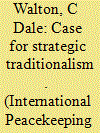

|
|
|
|
|
| Publication |
2009.
|
| Summary/Abstract |
Liberal peacemaking and peacebuilding are an inherently dangerous enterprise, which should be approached with great caution. This was demonstrated by numerous problematic liberal peacebuilding efforts in the 1990s and 2000s, events that underlined the view that there has been no fundamental global change in attitudes toward the use of violence for the attainment of political ends. As a result, Western leaders are likely to be much less inclined to undertake large-scale and/or difficult peacebuilding missions in the future. This is a desirable trend, as peacebuilding efforts undertaken by democracies should be guided fundamentally by national interests rather than humanitarian goals.
|
|
|
|
|
|
|
|
|
|
|
|
|
|
|
|
| 5 |
ID:
124148
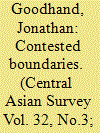

|
|
|
|
|
| Publication |
2013.
|
| Summary/Abstract |
In recent years there has been a growing focus in academic and policy circles on the changing roles of military and civilian actors in the context of multi-mandate peace and stabilization operations. This focus on 'civil-military cooperation' (CIMIC) and the related notion of the 'security-development nexus' reflect changed thinking about the causes of (and solutions to) to wars and insecurity, the role of external actors, and the balance between 'hard' and 'soft' forms of intervention. This article explores the civil-military interface in Afghanistan, focusing on the changing role of NGOs and specifically their growing but troubled relationship with externally promoted statebuilding and counterinsurgency. A recurring theme in the article is that of contested boundaries; CIMIC has been the site of intensive 'boundary work' in which NGOs and the military seek to negotiate or contest where boundaries are drawn and who has the power to draw (and police) them.
|
|
|
|
|
|
|
|
|
|
|
|
|
|
|
|
| 6 |
ID:
127070
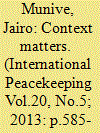

|
|
|
|
|
| Publication |
2013.
|
| Summary/Abstract |
The disarmament, demobilization and reintegration (DDR) programme as implemented in South Sudan provides a perfect entry point to study the interaction between an international intervention and local contexts. The article describes and analyses the DDR programme in South Sudan as a set of practices that are at the core of international peacekeeping and yet are highly challenged by the specificities of local contexts. Consequently, programme results are far from what the international organizations involved expected from the outset, and the case is a vivid example of a lack of context-based approaches to peacebuilding. The article is based on fieldwork conducted among practitioners, project implementers and ex-combatants in South Sudan in 2012.
|
|
|
|
|
|
|
|
|
|
|
|
|
|
|
|
| 7 |
ID:
115321
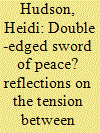

|
|
|
|
|
| Publication |
2012.
|
| Summary/Abstract |
Using a postcolonial-feminist approach, this article argues that the way in which gender is framed in peace interventions is symptomatic of the hegemonic way in which the discourses about the representation and protection of women within the liberal intervention model are constructed and institutionalized. Through an analysis of international discourses on the politics of inclusion/exclusion, protection, as well as sexual and gender-based violence (SGBV), it illustrates the disempowering effect of instrumentalist interpretations of women's agency. The article concludes that the embedded violence of liberal peacebuilding becomes even more pronounced when the gendered inner workings of international organizations, among others, are placed under scrutiny. It proposes a critical postcolonial-feminist vision that is resistant to universalist conceptions of women, gender and self to overcome the under-theorized gender dimensions of liberal peacebuilding.
|
|
|
|
|
|
|
|
|
|
|
|
|
|
|
|
| 8 |
ID:
108252
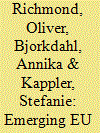

|
|
|
|
|
| Publication |
2011.
|
| Summary/Abstract |
The European Union (EU) is now emerging as a major actor in regional and global peacebuilding. Yet its peacebuilding approach and practices are subject to some significant and familiar contradictions. In this article, we identify the basis for what may become an 'EU peacebuilding framework' (EUPF), and argue that, while it aspires to a 'just and durable peace' including practical tools and a normative framework, these need to be set in critical relief. The EU's nascent approach to building peace is compared and contrasted with the evolving liberal peacebuilding consensus and the much criticized statebuilding project which has recently emerged. This is evaluated against recent research focusing on developing a more sophisticated form of contextually relevant peacebuilding. Finally, we assess how the embryonic EUPF might contribute to the development of a just and durable peace, and ask what sorts of issues and dimensions this raises.
|
|
|
|
|
|
|
|
|
|
|
|
|
|
|
|
| 9 |
ID:
109189
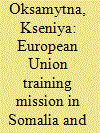

|
|
|
|
|
| Publication |
2011.
|
| Summary/Abstract |
The European Union Training Mission (EUTM) in Somalia, the EU's mission to contribute to the training of the Somali Security Forces, was deployed in April 2010 and extended for another 12-month period in July 2011. Despite the positive assessment of the outcome of the first training period, the overall feebleness of Somalia's Transitional Federal Government puts the political feasibility of the mission into question. EUTM Somalia can be subjected to many of the same criticisms as the liberal peacebuilding agenda in general for trying to contain rather than resolve conflict and maintaining a top-down perspective which ignores organic, indigenous local structures.
|
|
|
|
|
|
|
|
|
|
|
|
|
|
|
|
| 10 |
ID:
123262
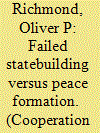

|
|
|
|
|
| Publication |
2013.
|
| Summary/Abstract |
This article outlines the often countervailing forces and norms of state formation, statebuilding and peacebuilding according to their associated theoretical approaches. It introduces a new concept of 'peace formation', which counterbalances a reliance on internal violent or externalised institutions' agency, reform and conditionality. Without incorporating a better understanding of the multiple and often critical agencies involved in peace formation, the states emerging from statebuilding will remain as they are: failed by design. This is because they are founded on externalised systems, legitimacy and norms rather than a contextual, critical and emancipatory epistemology of peace. Engaging with the processes of peace formation may aid international actors in gaining a better understanding of the roots of a conflict, how local actors may be assisted, how violence and power-seeking may be ended or managed and how local legitimacy may emerge.
|
|
|
|
|
|
|
|
|
|
|
|
|
|
|
|
| 11 |
ID:
190932
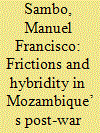

|
|
|
|
|
| Summary/Abstract |
It has been about three decades since Mozambique transitioned from a brutal civil war and one-party rule to peace and democracy. Although Mozambique has not relapsed into another large-scale civil war, sustainable peace and democracy in the country have become ever more elusive. In 2013, military clashes between Renamo and the Frelimo-led government resumed and prompted a new peace process, whilst poverty and inequalities are rampant, authoritarianism is on the rise, and an Islamic insurgency erupted in the northern region. Accordingly, while some scholars still praise Mozambique’s post-war peacebuilding as successful, others have claimed that peacebuilding failed. This article evades the binary of successful or failed liberal peacebuilding in Mozambique. Instead, it applies the concepts of friction and hybridity to offer an alternative way of reading the 30 years of peace (building) in Mozambique. The article argues that frictions in values and interests between the international/liberal peacebuilders and local (non-liberal) elites have resulted in a negative and unstable hybrid peace, that is, a precarious peace in Mozambique.
|
|
|
|
|
|
|
|
|
|
|
|
|
|
|
|
| 12 |
ID:
170278
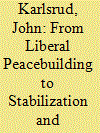

|
|
|
|
|
| Summary/Abstract |
Since the end of the Cold War, international interventions have increasingly been deployed to deal with internal conflict. Liberal peacebuilding has been a guiding concept for many of these interventions, in particular those deployed by the UN. This article argues that liberal peacebuilding is waning in importance, both as a guiding concept and in practice. After long engagements in Afghanistan and the enduring effects of the financial crisis, Western states are shifting their strategy from liberal peacebuilding to stabilization and counterterrorism. In Africa, regional ad hoc coalitions set up to fight terrorists and other armed groups are on the rise, and progressively included in UN peacekeeping operations. To examine these shifts more closely, the article focuses on the crisis in Mali since 2012 and the growing Western security presence in neighbouring Niger. The article concludes that the turn from liberal peacebuilding to stabilization and counterterrorism is likely to be counterproductive, as it will lead to more oppressive governments and more disillusioned people joining the ranks of opposition and terrorist groups, as well as undermine the UN in general and UN peace operations in particular.
|
|
|
|
|
|
|
|
|
|
|
|
|
|
|
|
| 13 |
ID:
160015
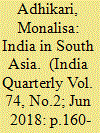

|
|
|
|
|
| Summary/Abstract |
In fragile and conflict-affected States1 (henceforth FCAS) in South Asia, two distinct forms of international engagement have worked simultaneously—the engagement of India, the regional hegemon, and that of Western states that promote liberal peacebuilding projects. From Norwegian engagement in Sri Lanka to European Union (EU) and United Nations (UN) engagement in Myanmar, to the UN-led international engagement in Nepal, liberal peacebuilding, despite its fault lines, has ubiquitous presence in South Asia, a region fraught with different forms of conflict and fragility. The norms, practices and modalities of engagement of India as well as of liberal peacebuilding projects have their distinct specificities in their normative foundations, practices and modalities of engagement. This article contends that the current interaction, though often unacknowledged, is marked by uncertainties, contrasts, instrumental use of norms, lack of coordination and even unexpected overlaps. This article primarily argues that in order for India to play a constructive role in the region, it needs to devise a policy on how it engages with liberal peacebuilding norms and its diffusion in practice through a variety of organisational and institutional networks.
|
|
|
|
|
|
|
|
|
|
|
|
|
|
|
|
| 14 |
ID:
124170
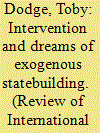

|
|
|
|
|
| Publication |
2013.
|
| Summary/Abstract |
The central thesis of this article is that when faced with state collapse, rising violence, and a complex stabilisation effort, the US, UN, and NATO in Afghanistan and the US and Britain in Iraq, deployed the dominant, if not only, international approach available, Liberal Peacebuilding. The article traces the rise of Liberal Peacebuilding across the 1990s. It argues that four units of analysis within neoliberal ideology, the individual, the market, the role of the state and democracy, played a key role within Liberal Peacebuilding, allowing it to identify problems and propose solutions to stabilise post-conflict societies. It was these four units of analysis that were taken from the Liberal Peacebuilding approach and applied in Afghanistan and Iraq. The application of a universal template to two very different countries led directly to the fierce but weak states that exist today.
|
|
|
|
|
|
|
|
|
|
|
|
|
|
|
|
| 15 |
ID:
139568
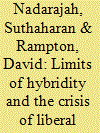

|
|
|
|
|
| Summary/Abstract |
Hybridity has emerged recently as a key response in International Relations and peace studies to the crisis of liberal peace. Attributing the failures of liberal peacebuilding to a lack of legitimacy deriving from uncompromising efforts to impose a rigid market democratic state model on diverse populations emerging from conflict, the hybrid peace approach locates the possibility of a ‘radical’, post-liberal, and emancipatory peace in the agency of the local and the everyday and ‘hybrid’ formations of international/liberal and local/non-liberal institutions, practices, and values. However, this article argues, hybrid peace, emerging as an attempt to resolve a problem of difference and alterity specific to the context in which the crisis of liberal peacebuilding manifests, is a problem-solving tool for the encompassment and folding into globalising liberal order of cultural, political, and social orders perceived as radically different and obstructionist to its expansion. Deployed at the very point this expansion is beset by resistance and crisis, hybrid peace reproduces the liberal peace's logics of inclusion and exclusion, and through a reconfiguration of the international interface with resistant ‘local’ orders, intensifies the governmental and biopolitical reach of liberal peace for their containment, transformation, and assimilation.
|
|
|
|
|
|
|
|
|
|
|
|
|
|
|
|
| 16 |
ID:
099145
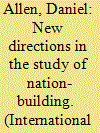

|
|
|
|
|
| Publication |
2010.
|
| Summary/Abstract |
The topic of nation-building is of enormous significance to both scholars and policymakers. Path dependence, a key theory of historical institutionalism, yields a great deal of insights into the extent to which conditions are favorable for outside actors to impose an institutional framework on a given society. Path dependence reveals several important variables that should be considered carefully in nation-building research. These variables include the effects of conflict on an occupied society, surviving institutions drawn upon by an occupier undertaking a policy of imposed nation-building, and the presence of a clear, salient national identity among the occupied society. This essay explores these variables with respect to four cases of outside-imposed nation-building to show the clearly divergent outcomes and their relationship to the variables of concern to a path dependence approach to the concept. Conclusions here are firmly in line with critiques of liberal peacebuilding as a universal template for imposed development.
|
|
|
|
|
|
|
|
|
|
|
|
|
|
|
|
| 17 |
ID:
133603
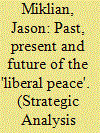

|
|
|
|
|
| Publication |
2014.
|
| Summary/Abstract |
The stunted and stumbling progress of the 'liberal peace' philosophy since 1990 tells a complex story. In this article, I give a history of the liberal peace project from its academic and activist origins to today's global application, discussing how policymakers and liberal peace architects see liberal peacebuilding, and how emerging powers such as India and China relate to these goals. I close with a discussion of the future of liberal peacebuilding, the 'Business for Peace' paradigm and how relationships between powerful states and their peripheries will still matter despite a more consolidated international aid community.
|
|
|
|
|
|
|
|
|
|
|
|
|
|
|
|
| 18 |
ID:
171770
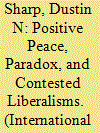

|
|
|
|
|
| Summary/Abstract |
This essay revisits Johan Galtung's early articulation of the concept of “positive peace” in order to re-surface its fundamental radicalism, together with some of its inherent tensions, paradoxes, and politics. It then explores the linkages and contested relationship between the concept of positive peace and the prevailing peacebuilding paradigm of our day: liberal peacebuilding. I argue that our understanding of debates about both positive peace and liberal peacebuilding can be clarified when viewed through the lens of contested liberalisms and conflicting liberal values. Such debates often appear to reflect more of a political and ideological debate within the larger liberal tradition itself and between competing liberal values than some kind of choice between liberal, illiberal, or “postliberal” peacebuilding. Advancing peace theory and praxis at this stage would benefit from an increasing willingness to more openly confront some of these choices and a greater degree of transparency about our liberal commitments, including in the hard, “real world” cases where tensions seem irreconcilable.
|
|
|
|
|
|
|
|
|
|
|
|
|
|
|
|
| 19 |
ID:
196021


|
|
|
|
|
| Summary/Abstract |
The Post-Rebel Electoral Parties (PREP) dataset offers an important new tool to study the transformation of rebel groups into political parties. It provides longitudinal data on the electoral participation and performance in national elections of political parties formed by armed opposition groups after civil war. Post-rebel electoral parties sit at the center of overlapping research agendas that address how best to build durable peace, and how to build resilient political systems and capable states after devastating conflict. A better understanding of how and why these parties participate and perform in elections over time is critical to any assessment of liberal peacebuilding. These parties – their strategic choices, organizational development, and impact on the political systems in which they participate – are also relevant to the broader study of comparative democratization, political parties, and party systems. Our dataset follows these parties forward through up to three decades of participation in postwar electoral politics. The current version of the data consists of 78 distinct parties derived from 56 conflict actors. The data cover 322 legislative election years and 216 executive elections in 39 countries over 30 years (1990–2021). This article describes the data and articulates the need for and motivation behind the dataset. We then illustrate the relevance of the data by testing the impact of rebel participation on the long-term peace.
|
|
|
|
|
|
|
|
|
|
|
|
|
|
|
|
| 20 |
ID:
124145
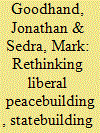

|
|
|
|
|
| Publication |
2013.
|
| Summary/Abstract |
This special issue coincides with a period of large-scale international troop withdrawals from Afghanistan, with a scheduled transition to 'Afghan ownership' in 2014. This latest 'transition' in Afghanistan's protracted conflict represents an interesting juncture at which to analyse and assess the record of statebuilding efforts in the country and their wider implications. In many respects, the changing narratives around intervention and statebuilding in Afghanistan resonate with and reflect wider shifts in thinking and policies related to security, peacebuilding, and statebuilding.
|
|
|
|
|
|
|
|
|
|
|
|
|
|
|
|
|
|
|
|
|